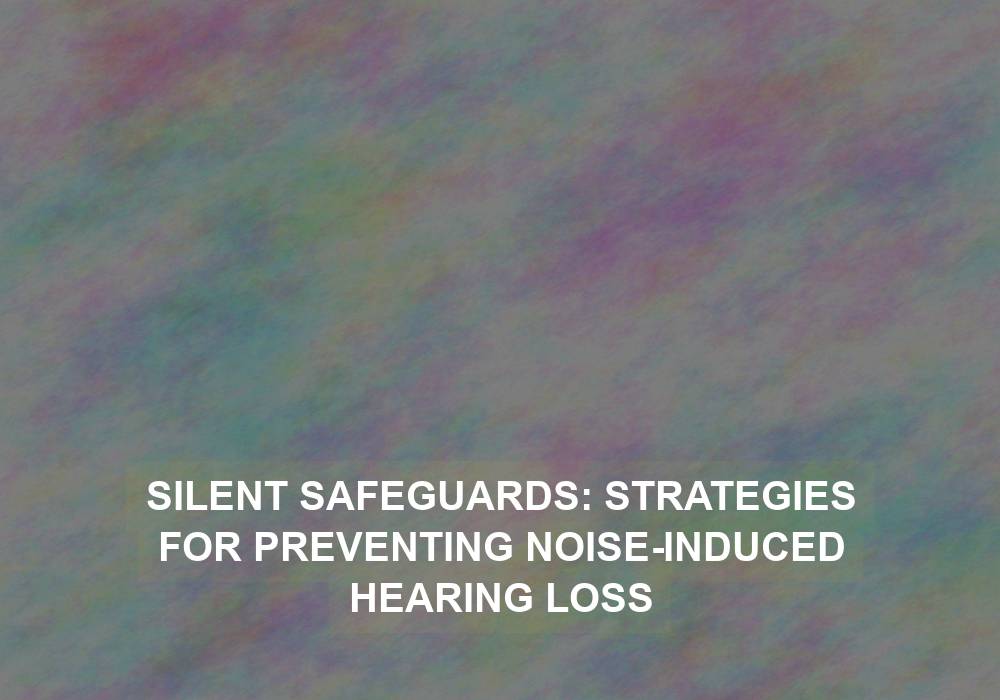Noise-induced hearing loss (NIHL) is a common and preventable condition that affects millions of people worldwide. Exposure to excessive noise can lead to permanent damage to the sensitive structures of the inner ear, resulting in hearing loss. However, by implementing certain strategies and taking necessary precautions, individuals can safeguard their hearing and prevent the onset of NIHL. In this article, we will discuss effective measures and practical tips to protect your hearing from noise-induced damage.
Understanding Noise-Induced Hearing Loss
Before diving into preventive strategies, it is important to understand what noise-induced hearing loss entails. Noise-induced hearing loss refers to the gradual or sudden damage caused by prolonged exposure to loud noises. It typically occurs when the delicate hair cells in the inner ear, responsible for transmitting sound signals to the brain, become damaged or destroyed.
Common Causes of Noise-Induced Hearing Loss
-
Occupational Noise: Workers in industries such as construction, manufacturing, mining, and entertainment are often exposed to high levels of noise, increasing their risk of developing NIHL. It is important for employers to provide hearing protection devices, establish noise control measures, and regularly monitor noise levels to ensure the safety of their employees.
-
Recreational Activities: Participating in activities such as attending concerts, using power tools, and riding motorcycles without proper hearing protection can contribute to the development of NIHL. It is recommended to wear earplugs or earmuffs in these situations to reduce the intensity of the sound and protect your hearing.
-
Personal Listening Devices: Excessive and prolonged use of personal listening devices, such as smartphones and MP3 players, at high volume levels can also lead to noise-induced hearing loss. To prevent this, it is important to be mindful of the volume levels you expose your ears to and to follow the 60/60 rule, which advises listening at no more than 60% of the maximum volume for no longer than 60 minutes at a time. Investing in noise-canceling headphones can also help reduce the need to increase the volume in noisy environments.
Implementing Preventive Measures to Safeguard Your Hearing
1. Wear Hearing Protection
Wearing appropriate hearing protection is crucial in reducing the risk of developing NIHL. Consider using earplugs or earmuffs when exposed to loud noises, whether at work or during recreational activities. It is important to ensure that the hearing protection devices are properly fitted and offer sufficient noise reduction. This will help protect the delicate hair cells in your inner ear from damage.
2. Limit Exposure to Loud Noises
Try to limit your exposure to loud noises whenever possible. If you frequently attend concerts or live performances, for example, consider moving away from the speakers or wearing earplugs to reduce the intensity of the sound. Additionally, take breaks in quieter areas to give your ears some time to rest and recover. This will help prevent overexposure to loud noises and reduce the risk of developing NIHL.
3. Maintain a Safe Distance
When involved in activities that generate loud noises, maintaining a safe distance from the source of the noise can significantly reduce the risk of damage to your hearing. For instance, if you are at a construction site, make sure you are at a distance from heavy machinery or other noisy equipment. By keeping a safe distance, you can minimize the impact of the loud noise on your ears and protect your hearing.
4. Follow Occupational Safety Guidelines
If you work in a noisy environment, ensure that you adhere to all occupational safety guidelines and regulations. Employers should provide hearing protection devices and establish noise control measures, such as implementing sound barriers and regular monitoring of noise levels. It is essential to report any concerns or issues regarding noise exposure to your employer. By following these guidelines, you can create a safer work environment and reduce the risk of developing NIHL.
5. Be Mindful of Personal Listening Habits
When using personal listening devices, be mindful of the volume levels you expose your ears to. It is recommended to follow the 60/60 rule, which advises listening at no more than 60% of the maximum volume for no longer than 60 minutes at a time. Additionally, consider investing in noise-canceling headphones that reduce the need to increase the volume in noisy environments. By being mindful of your personal listening habits, you can protect your hearing and prevent the onset of NIHL.
6. Educate Yourself and Others
Raise awareness about the risks of noise-induced hearing loss among your family, friends, and colleagues. Educate them about the importance of hearing protection, the consequences of prolonged exposure to loud noises, and the available preventive measures. By spreading knowledge, you can help create a safer and more hearing-conscious environment. Encourage others to wear hearing protection and provide them with information on how to protect their hearing in different situations.
7. Regular Hearing Check-ups
Periodic hearing check-ups are crucial in detecting any potential hearing loss early on. Schedule regular visits to an audiologist or hearing healthcare professional who can assess your hearing and provide recommendations based on your specific needs. Early detection allows for timely intervention and potential prevention of further hearing damage. Regular hearing check-ups are especially important for individuals who are frequently exposed to loud noises, such as those working in noisy industries.
Conclusion
Noise-induced hearing loss is a preventable condition that can have a significant impact on an individual’s quality of life. By implementing strategies such as wearing hearing protection, limiting exposure to loud noises, maintaining a safe distance, and following occupational safety guidelines, you can safeguard your hearing and reduce the risk of developing NIHL. Remember to educate yourself and others about the importance of hearing protection and to schedule regular hearing check-ups to ensure early detection and intervention. Protecting your hearing today will help preserve your ability to enjoy the sounds of life in the years to come.
Note: The above content is provided in markdown format for the given title.
